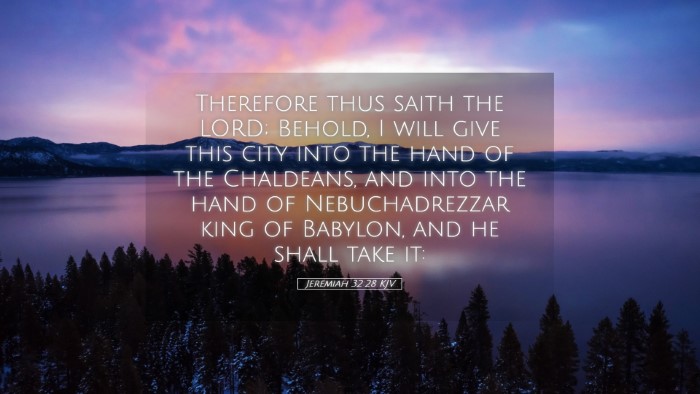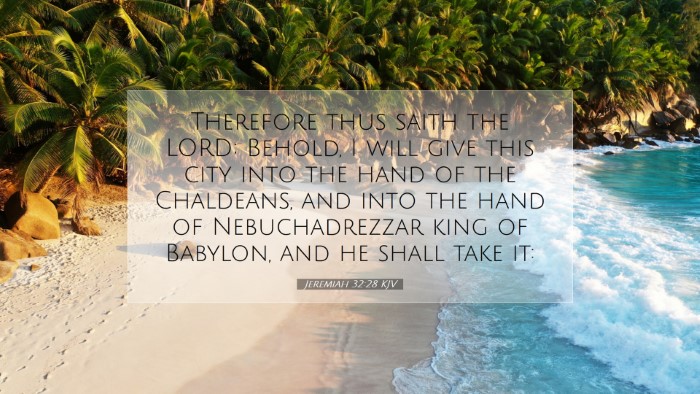Commentary on Jeremiah 32:28
Verse Reference: Jeremiah 32:28 - "Therefore thus saith the Lord; Behold, I will give this city into the hand of the Chaldeans, and into the hand of Nebuchadnezzar king of Babylon."
Context Overview
The Book of Jeremiah is set against the backdrop of impending judgment upon Jerusalem due to its unfaithfulness to God. In this verse, God explicitly declares that the city will fall into the hands of the Chaldeans, represented by Nebuchadnezzar, who is a historical embodiment of Babylon's might. This statement underscores the themes of divine sovereignty and judgment, as well as the fulfillment of prophetic warnings. The context encompasses both the immediate historical setting of Jerusalem's siege and the broader spiritual implications for Israel's covenant relationship with God.
Theological Insights
This verse is pivotal in demonstrating God's control over nations and leaders. It affirms the belief that all authority is ultimately derived from Him, as noted by Matthew Henry, who emphasizes that God’s sovereignty is not limited by human actions or desires. God, in His infinite wisdom, uses even the nations that oppose Him to accomplish His divine purposes.
Commentary Excerpts
- Matthew Henry: Henry stresses the inevitability of judgment as a consequence of persistent disobedience. He contextualizes God's pronouncement as both a warning to the people of Jerusalem and an indication of God's unwavering commitment to justice. He notes that the prophetic declaration serves to remind the faithful of the seriousness of covenant fidelity and the dire consequences of transgression.
- Albert Barnes: Barnes provides insight into the geopolitical ramifications of this verse. He elaborates on the significance of Nebuchadnezzar's rise and the Lord's control over such affairs. Barnes highlights that this predicted event not only fulfilled previous prophecies but also acted as a warning that would resonate throughout Israel's history, emphasizing the importance of repentance and alignment with God's will.
- Adam Clarke: Clarke offers a more detailed historical perspective, noting that the siege of Jerusalem was both a physical and spiritual event. He articulates that God's intention was to purify His people through adversity, pushing them towards genuine repentance. Clarke connects the warning to a broader narrative of hope, where God's ultimate plan for restoration is always present amid judgment.
Practical Applications
For contemporary readers, this verse serves as a stark reminder of the consequences of national moral failure. It challenges pastors and theologians to lead congregations in reflection on current national issues and the potential divine ramifications. It also encourages believers to maintain a posture of repentance and faithfulness to God's covenant.
Additionally, the verse stresses the importance of obedience and faithfulness not only within individual lives but also within the collective body of Christ. For students and scholars, the examination of this text invites deep theological inquiry into the nature of God’s judgment and mercy, the role of prophets, and divine intervention in human history.
Conclusion
Jeremiah 32:28 illuminates the profound truth that God remains sovereign over human affairs, even in tumultuous times. It calls for vigilance in spiritual faithfulness and offers hope that despite judgment, God’s plans for restoration and redemption remain intact. This passage, in its essence, is not merely a condemnation, but an invitation to reflect on God’s unending grace and mercy.
As pastors, theologians, and believers engage with this text, it becomes a catalyst for both personal and communal renewal, prompting a deeper understanding of God’s character and His dealings with humanity.


